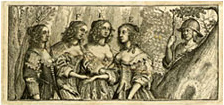Anthony Huish, Priscianus Ephebus (1663)
Full Text
Not available
EEBO/TCP
Not available
Date
1663
Lexicographer
Lexicon title
A Dictionary Latine and English, Declining all the Latine Words of the several Examples of this Priscianus Ephebus, Which may save the Learners the buying any other Dictionary till they have learned this Book
Book title
Priscianus ephebus, or, A more full and copious explanation of the rules of syntax heretofore briefly delivered and printed under the name of Priscianus Nascens, offering certain rules directing to a more facile and sure way of translating English into Latin, or Latin into English, than hitherto hath been given : together with variety of choice examples, moral, and others, with the exceptions to the several rules : in all things clearing and smoothing the vvay to the syntax, both English and Latin, of the usual grammar, commonly called Lilies grammar : with divers necessary indexes for the more ready use of this book : the one of them being a parallel of the rules of this book, with the rules of Lilies grammar : together with a preface shewing the practise and benefit of both the Priscians, nascens, and ephebus.
Publication place
London
Printer
John Redmayne
Publisher
William Garret
Text type
printed book
Genre
Bilingual and polyglot dictionaries, glossaries, and vocabularies
Subject area
- Latin
- proper name
Summary
Besides the dictionary, the book includes "An Index of the Proper Names mentioned in this Book, Unto which, where they are Derivatives, are added their Primitives."
Language
headwords: Latin
explanations: English
explanations: English
explanations: English
explanations: English
Extent
(a) l4r-qq4r;
(b) qq4v-ss2v
Word-group
type: alphabetical
Word-entry
type: headword
sample: (a) Cacus, a, um. Blinde, dark, uncertain, ignorant. (o4v) (b) Verres, is, m g. A Nobleman of Rome, very covetous; Prætor in Sicily; one of them accused of extortion, prosecuted by Tully, and condemned. (ss2v)
sample: (a) Cacus, a, um. Blinde, dark, uncertain, ignorant. (o4v) (b) Verres, is, m g. A Nobleman of Rome, very covetous; Prætor in Sicily; one of them accused of extortion, prosecuted by Tully, and condemned. (ss2v)
Wing
H3355
Other editions
1668: Wing H3356 (Alston XVI.269)
Criticisms
Facchinetti, Roberta. "Bilingual Lexicography in 17th-century England: The Case of Anthony Huish." Linguistica e filologia 3 (1996): 209-29. view record
Facchinetti, Roberta. "Anthony Huish: A 17th-century English Grammarian." Advances in English Historical Linguistics (1996). Eds. Jacek Fisiak and Marcin Krygier. Berlin: Mouton de Gruyter, 1998. 53-62. view record
Facchinetti, Roberta. "Anthony Huish: A 17th-century English Grammarian." Advances in English Historical Linguistics (1996). Eds. Jacek Fisiak and Marcin Krygier. Berlin: Mouton de Gruyter, 1998. 53-62. view record




